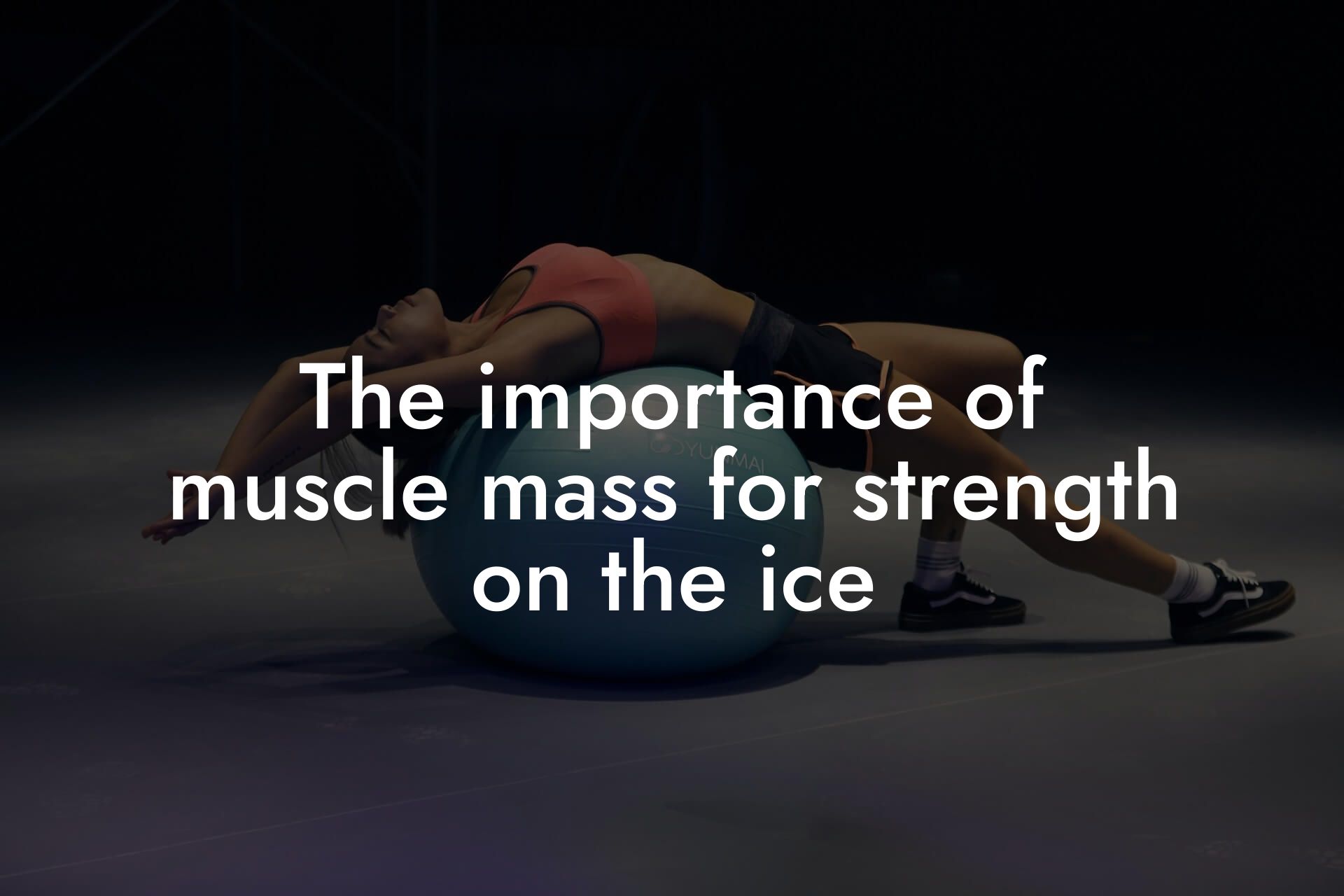As a high-earning professional, you understand the importance of maintaining peak physical performance to excel in your career. Whether you're a figure skater, hockey player, or simply enjoy ice skating as a hobby, nutrition plays a crucial role in sustaining energy levels on the ice. A well-balanced diet can make all the difference in your performance, recovery, and overall well-being. In this article, we'll provide you with expert nutrition tips to help you power through your ice-based activities.
Table of Contents
- Hydrate, Hydrate, Hydrate
- Carbohydrates: The Energy-Boosting Macronutrient
- Protein: The Building Block of Muscle
- Healthy Fats: The Energy-Dense Macronutrient
- Pre-Game Meal: Fueling for Optimal Performance
- Snacking on the Go: Maintaining Energy Levels
- Post-Game Recovery: Refueling for Optimal Recovery
- Electrolyte Balance: The Key to Optimal Performance
- Frequently Asked Questions
Hydrate, Hydrate, Hydrate
Adequate hydration is essential for optimal physical performance. When you're on the ice, you lose water and electrolytes through sweat, which can lead to dehydration, fatigue, and decreased performance. To combat this, make sure to drink plenty of water before, during, and after your ice session. Aim to consume at least 8-10 glasses of water per day, and consider adding electrolyte-rich beverages like coconut water or sports drinks to your routine.
Carbohydrates: The Energy-Boosting Macronutrient
Carbohydrates are the primary source of energy for your body, and they're especially important when engaging in high-intensity activities like ice skating. Focus on complex carbohydrates such as whole grains, fruits, and vegetables, which provide sustained energy release. Include carbohydrate-rich foods like brown rice, quinoa, whole wheat bread, and sweet potatoes in your diet to ensure you have the energy you need to power through your ice sessions.
Protein: The Building Block of Muscle
Protein is essential for muscle growth, repair, and maintenance. As an ice skater, you need protein to support muscle function and recovery. Aim to consume 1.2-1.6 grams of protein per kilogram of body weight from sources like lean meats, fish, eggs, dairy, and plant-based options like beans, lentils, and tofu. Include protein-rich foods in your meals and snacks to support muscle function and recovery.
Healthy Fats: The Energy-Dense Macronutrient
Healthy fats are an essential source of energy for your body, and they're particularly important when engaging in high-intensity activities like ice skating. Focus on unsaturated fats from sources like nuts, seeds, avocados, and olive oil, which provide sustained energy release and support overall health. Include healthy fats in your meals and snacks to ensure you have the energy you need to perform at your best.
Pre-Game Meal: Fueling for Optimal Performance
Your pre-game meal should provide the energy you need to power through your ice session. Aim to eat a balanced meal that includes complex carbohydrates, protein, and healthy fats 1-3 hours before your ice session. Examples of pre-game meals include:
- Grilled chicken breast with brown rice and steamed vegetables
- Whole wheat toast with avocado and scrambled eggs
- Quinoa salad with grilled salmon, mixed vegetables, and a citrus vinaigrette dressing
Snacking on the Go: Maintaining Energy Levels
Snacking on the go can help maintain energy levels during your ice session. Opt for snacks that are high in carbohydrates and protein, and low in added sugars and unhealthy fats. Examples of healthy snacks include:
- Fresh fruits like bananas, apples, and berries
- Nuts and seeds like almonds, cashews, and pumpkin seeds
- Energy bars made with wholesome ingredients like nuts, seeds, and dried fruits
- Jerky made from lean meats like turkey, chicken, or beef
Post-Game Recovery: Refueling for Optimal Recovery
After your ice session, it's essential to refuel your body with a balanced meal or snack that includes carbohydrates and protein. This helps promote muscle recovery, reduce muscle soreness, and replenish energy stores. Aim to consume a post-game meal or snack within 30-60 minutes after your ice session. Examples of post-game meals or snacks include:
- Chocolate milk with protein powder and whole grain crackers
- Greek yogurt with mixed berries and honey
- Turkey and avocado wrap with mixed greens and whole wheat tortilla
Electrolyte Balance: The Key to Optimal Performance
Electrolytes like sodium, potassium, and magnesium play a crucial role in maintaining optimal performance on the ice. These essential minerals help regulate fluid balance, nerve function, and muscle contractions. Include electrolyte-rich foods like bananas, avocados, and nuts in your diet, and consider adding electrolyte supplements or sports drinks to your routine to ensure optimal electrolyte balance.
By incorporating these nutrition tips into your daily routine, you'll be able to maintain energy levels, optimize performance, and recover faster from your ice-based activities. Remember to stay hydrated, fuel your body with a balanced diet, and listen to your body's nutritional needs to take your performance to the next level.
Frequently Asked Questions
What are the most important nutrients for maintaining energy on the ice?
As an athlete, it's essential to fuel your body with the right nutrients to maintain energy levels during ice-based activities. The most critical nutrients for energy production are complex carbohydrates, lean proteins, and healthy fats. These macronutrients provide the necessary energy for your muscles to function optimally. Additionally, adequate hydration and electrolyte balance are crucial for maintaining energy levels and preventing fatigue.
How do I ensure I'm getting enough complex carbohydrates?
Complex carbohydrates are rich in fiber, vitamins, and minerals, making them an excellent source of energy. Include whole grains, fruits, and vegetables in your diet to ensure you're getting enough complex carbohydrates. Some examples of complex carbohydrates include brown rice, quinoa, whole wheat bread, and sweet potatoes.
What are some examples of lean protein sources?
Lean protein sources are essential for muscle repair and recovery. Some examples of lean protein sources include chicken breast, turkey breast, fish, tofu, lentils, and low-fat dairy products. Aim to include a source of lean protein in every meal to support muscle function and energy production.
How do I stay hydrated during ice-based activities?
Staying hydrated is crucial for maintaining energy levels and preventing fatigue. Aim to drink at least 8-10 glasses of water per day, and make sure to drink water before, during, and after your ice-based activities. You can also consume electrolyte-rich beverages like sports drinks or coconut water to replenish lost electrolytes.
What are electrolytes, and why are they important?
Electrolytes are minerals that carry an electric charge and are essential for various bodily functions, including energy production and nerve function. During ice-based activities, you lose electrolytes through sweat, which can lead to fatigue, cramping, and dizziness. Electrolytes like sodium, potassium, and magnesium are crucial for maintaining energy levels and preventing dehydration.
How can I prevent energy crashes during ice-based activities?
To prevent energy crashes, make sure to fuel your body with a balanced meal or snack that includes complex carbohydrates, lean proteins, and healthy fats about 1-2 hours before your ice-based activity. Additionally, stay hydrated by drinking water or electrolyte-rich beverages before, during, and after your activity.
What are some healthy snack options for maintaining energy?
Healthy snack options that can help maintain energy levels include fruits, nuts, energy bars, trail mix, and sandwiches made with whole grain bread and lean protein sources. Aim for snacks that are high in complex carbohydrates and lean proteins to provide a sustained energy boost.
Can I consume caffeine to boost energy?
Caffeine can provide a temporary energy boost, but it's essential to consume it in moderation. Excessive caffeine consumption can lead to energy crashes, jitters, and dehydration. Limit your caffeine intake to 1-2 cups per day, and avoid consuming it close to your ice-based activities.
How does sleep affect energy levels?
Sleep plays a critical role in energy production and recovery. Aim for 7-9 hours of sleep per night to help your body recover from the physical demands of ice-based activities. Poor sleep quality and duration can lead to fatigue, decreased energy levels, and impaired performance.
What are some tips for maintaining energy during long ice-based activities?
To maintain energy during long ice-based activities, make sure to fuel your body with a balanced meal or snack before the activity, stay hydrated by drinking water or electrolyte-rich beverages, and take regular breaks to rest and stretch. Additionally, consider consuming energy gels or chews that provide a quick source of energy.
How can I monitor my energy levels?
Monitor your energy levels by paying attention to your body's signals, such as fatigue, dizziness, or lightheadedness. Keep a food and activity diary to track your energy levels and identify patterns or triggers that may affect your energy. This will help you make informed decisions about your nutrition and training plan.
What are some common energy-boosting supplements?
Some common energy-boosting supplements include creatine, branched-chain amino acids (BCAAs), and adaptogenic herbs like ginseng and ashwagandha. However, it's essential to consult with a healthcare professional or registered dietitian before adding any supplements to your routine.
Can I consume energy drinks to boost energy?
Energy drinks can provide a temporary energy boost, but they often contain high levels of sugar, caffeine, and other stimulants that can lead to energy crashes, jitters, and dehydration. It's recommended to limit or avoid energy drinks and instead focus on a balanced diet and hydration plan.
How does stress affect energy levels?
Stress can significantly impact energy levels by causing fatigue, anxiety, and decreased motivation. Engage in stress-reducing activities like meditation, yoga, or deep breathing exercises to help manage stress and maintain energy levels.
What are some tips for maintaining energy during high-intensity ice-based activities?
To maintain energy during high-intensity ice-based activities, make sure to fuel your body with a balanced meal or snack that includes complex carbohydrates, lean proteins, and healthy fats about 1-2 hours before the activity. Additionally, stay hydrated by drinking water or electrolyte-rich beverages, and consider consuming energy gels or chews that provide a quick source of energy.
How does nutrition affect bone density?
Nutrition plays a critical role in maintaining bone density. A diet rich in calcium, vitamin D, and other essential nutrients can help support bone health and prevent injuries. Additionally, adequate protein intake is essential for muscle function and bone density.
What are some nutrition tips for maintaining physique?
To maintain a lean physique, focus on a balanced diet that includes lean protein sources, complex carbohydrates, and healthy fats. Aim to eat a variety of colorful fruits and vegetables, whole grains, and lean protein sources like chicken, fish, and tofu. Additionally, stay hydrated and limit your intake of processed foods and added sugars.
How does body fat percentage affect energy levels?
Excess body fat can affect energy levels by reducing insulin sensitivity, increasing inflammation, and decreasing mitochondrial function. Maintaining a healthy body fat percentage through a balanced diet and regular exercise can help improve energy levels and overall health.
What are some tips for maintaining energy during long periods of sitting?
To maintain energy during long periods of sitting, take regular breaks to stand up, stretch, and move around. Additionally, stay hydrated by drinking water, and consider consuming small snacks that include complex carbohydrates and lean proteins to provide a sustained energy boost.
How can I stay motivated to maintain energy levels?
Stay motivated to maintain energy levels by setting realistic goals, tracking your progress, and celebrating small victories. Additionally, find an accountability partner or join a fitness community to provide support and motivation.
What are some common energy-draining foods?
Common energy-draining foods include processed foods, added sugars, and saturated fats. These foods can cause energy crashes, inflammation, and decreased motivation. Limit or avoid these foods and focus on a balanced diet that includes whole, nutrient-dense foods.
How does hydration affect energy levels?
Hydration plays a critical role in energy production and maintenance. Even mild dehydration can lead to fatigue, decreased energy levels, and impaired performance. Aim to drink at least 8-10 glasses of water per day, and make sure to drink water before, during, and after your ice-based activities.
What are some tips for maintaining energy during travel?
To maintain energy during travel, make sure to stay hydrated by drinking water, and consider consuming small snacks that include complex carbohydrates and lean proteins to provide a sustained energy boost. Additionally, try to maintain a regular sleep schedule and engage in stress-reducing activities like meditation or deep breathing exercises.
Here are some related articles you might love...
- The importance of muscle mass for strength on the ice
- Reducing body fat for better speed and agility in hockey
- Off-season training strategies for amateur hockey players
- Recovery techniques for hockey athletes after games
- How body composition affects hockey performance
- Strength and conditioning programs for hockey players
- The benefits of DEXA scans for amateur hockey players
- Balancing strength, speed, and agility in hockey
- Bone density and injury prevention in hockey
Zak Faulkner
Zak Faulkner is a leading authority in the realm of physical health and body composition analysis, with over 15 years of experience helping professionals optimise their fitness and well-being. As one the experts behind Tano Performance Group, Zak has dedicated his career to providing in-depth, science-backed insights that empower clients to elevate their physical performance and overall health.
With extensive knowledge of DEXA technology, Zak specializes in delivering comprehensive body assessments that offer precise data on body fat, muscle mass, bone density, and overall physique. His expertise enables individuals to make informed decisions and achieve their fitness goals with accuracy and confidence. Zak’s approach is rooted in a deep understanding of human physiology, combined with a passion for helping clients unlock their full potential through personalised strategies.
Over the years, Zak has earned a reputation for his commitment to excellence, precision, and client-focused service. His guidance is trusted by top professionals who demand the best when it comes to their health. Whether advising on fitness programs, nutritional strategies, or long-term wellness plans, Zak Faulkner’s insights are a valuable resource for anyone serious about taking their health and fitness to the next level.
At Tano Performance Group, Zak continues to lead our Content Team revolutionising how professionals approach their physical health, offering unparalleled expertise that drives real results.




